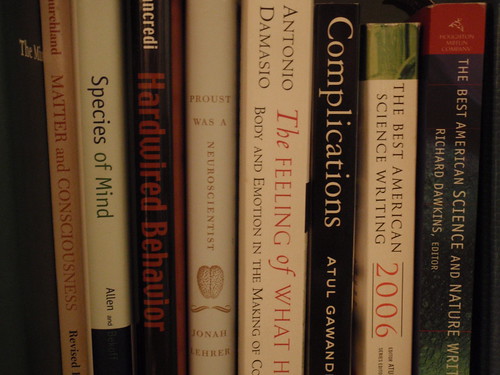Science! That’s what Ammie and I are writing about this week for our tandem posts. I’m excited. Hop on over to still life to read Ammie’s post here.
My favorite thing about science is the stories. No matter how wacky our ideas about the natural world may be, science will surprise us with something even crazier.
As a working scientist, I find this to be a constant source of hilarity and frustration. My motto inside the lab is this: Shit goes wrong all the time. It’s my job to fix it and make it work. I say this to myself because the vulgarity makes me laugh and then in the quiet moment afterward, I am reminded that things rarely go according to plan and this is okay. It’s part of the scientific process.
I don’t love fixing things. I tolerate it, and I’ve certainly become better at it as the years in the lab have grown longer. But I love being part of a storymaking process. I am one of a few people in the world who are witnessing the story that science is telling through my experiments. It is an extraordinary feeling. When I was an undergraduate and thinking very strongly about going to grad school in science, other students would groan and say, “Ugh, I hate lab!” They were referring to the various lab exercises associated with our classes. And the truth is that I hated lab too! They were usually in the afternoon, when I was feeling lethargic after lunch and a full morning of classes. The lab exercises tended to be stand-alone activities, something we were supposed to finish in three or four hours, then write up as a cute little lab report to turn in the next week. There wasn’t much of a story to tell.
But I knew there had to be more to science than classroom-based lab exercises. After all, there were thousands of stories tucked into all those expensive textbooks I had to buy, stories where the heroes didn’t know what they were going to get when they mixed this extract with that protein. Then there are all those glorious stories about accidental discoveries, like ampicillin.
So I went off to grad school and it was hard. My PhD training challenged me, humbled me, infuriated me, and ultimately fortified me, strengthening both my persistence and my belief in science. It also let me be a part of some great stories, and that was the best part.
Now, as a postdoc in a lab that is new to me, I get to continue my scientific storytelling. Science continues to challenge, humble, and infuriate me—it’s why I do a lot of yoga and focus so much on the wonderful things in my life outside the lab. I can’t depend on science to keep me happy because it often disappoints me. But in my calm, reflective moments, I feel very blessed to participate in such an enduring and respected institution that accepts all hypotheses with equal consideration. I have always loved that science will take whatever you can throw at it, and in the end, the data must speak for themselves.
After the data collection, the scientific process is storytelling. It was Matt who really taught me this basic fact about the way we talk about our science: we tell a story, using our data as the evidence to back up our claims. The distinction between fiction and science is blurrier than I realized, which makes me think of science as a lump of clay that gets passed around a globe’s worth of researchers, each person leaving a thumbprint or smoothing out an unsightly blob that no one really liked in the first place. And when doing science has fried my brain and I think that maybe I don’t really want to be a scientist any more, I remember all the stories with which science has amused and delighted me, and I hope that some day I’ll be able to write down all my stories and they will amuse and delight some future scientist. Science is only as vibrant as the person doing the science…or the storyteller who shares the tale with us.



4 comments:
If what you write here is any indication, and I think it is, future scientists will be more than delighted with your stories.
Thank you, Laurie! That's so kind of you to say that.
Ah, I love your take on this! It makes me understand why you do what you do. I love the stories too, and I'm glad to hear that they aren't just a random side effect of dour scientists, or at least not always :) A lovely post, friend.
a, I think there are many flavors of scientist, and some of them are dour! That's why I appreciate science writers who can tell a story, regardless of who is doing the science.
I happen to love how scientists are constantly revising their story, published or not. It's a peculiar thing that nothing is safe from revision in science--not even gravity or evolution! Though those topics are probably safer than many :-)
Post a Comment